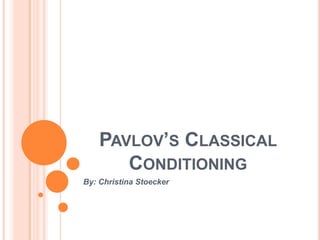
Pavlov’s Classical Conditioning
- 1. PAVLOV’S CLASSICAL CONDITIONING By: Christina Stoecker
- 2. WHO IS PAVLOV? Ian Pavlov was a famous Russian psychologist He lived from 1849 to 1936 He made many discoveries in the psychology field Pavlov won the Nobel Prize in psychology in 1904
- 3. WHAT IS CLASSICAL CONDITIONING? Classical Conditioning- A learned reflex/response that you do when evoked by a stimulus Pavlov performed experiments with dogs on to collect saliva He noticed that the dogs would salivate when powdered meat was present
- 4. WHAT IS CLASSICAL CONDITIONING? Pavlov associated the ringing of a bell with the presence of powdered meat He rang the bell every time the dogs were served food Pavlov started ringing the bell and the dogs would salivate without the powdered meat being present Thus, a learned reflex
- 6. IN THE CLASSROOM Teachers can use classical conditioning to quiet down the students Example: First day of class, students walk into class and teacher sits at desk Teacher goes towards board when ready to teach and children quiet down Second day of class, students are chatty when the teacher goes to the board. Teacher asks to be quiet. Third day of class, students are automatically quiet when the teacher walks to the board
- 7. IN THE CLASSROOM Teachers can use classical conditioning to quiet down the students Example: First day of class, the teacher turns on the projector to do their lesson and students quiet down Second day of class, the students are still chatty when the projector turns on. The teacher must ask them to quiet down Third day of class, the students quiet down when the projector is turned on
- 8. IN THE CLASSROOM Students will be conditioned in a positive manner Students will learn the expectations of their teachers Students will learn the expectations of their school
- 9. MY OWN TEACHING I think that classical conditioning can be beneficial when used correctly I don’t want to abuse what the condition is for Only to be used to maintain positive authority in the classroom
- 10. CREDITS Information: http://www.simplypsychology.org/pavlov.html http://www.learning-theories.com/classical-conditioning- pavlov.html http://www.nobelprize.org/nobel_prizes/medicine/laureat es/1904/pavlov-bio.html Pictures: http://en.wikipedia.org/wiki/Ivan_Pavlov http://www.simplypsychology.org/pavlov.html Clip Art